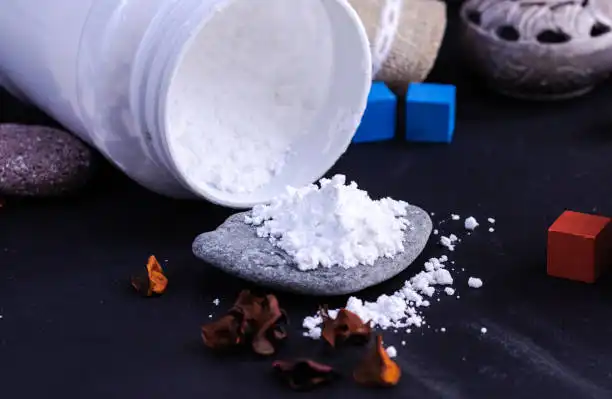Introduction of Creatine Monohydrate
Creatine monohydrate is an essential compound integral to energy synthesis within our muscular tissues. Though it's naturally present in limited quantities in foods like meats and seafood, most dietary supplements leverage synthesized creatine made in a laboratory. The production of creatine monohydrate involves merging specific amino acids - glycine, arginine, and methionine. The origins of these amino acids are not from animals, making the final product compatible with vegetarian diets. The "monohydrate" suffix denotes that one water molecule is attached to each creatine molecule, improving its stability and absorption capabilities.
It's worth noting that while the raw materials used in creatine synthesis are vegetarian-friendly, the production process may vary between manufacturers. Some companies explicitly state that their powder creatine monohydrate is vegetarian or vegan, providing additional assurance for those following plant-based diets.
Vegetarian Sources of Creatine
Creatine monohydrate pills usually mesh well with vegetarian eating plans; nonetheless, the primary foodstuff that naturally contains this compound predominantly stems from animal products. This can introduce an obstacle for individuals who strictly follow a vegetarian diet and solely rely on food-based consumption to fulfill their creatine requirements.
Vegetarian diets typically provide minimal amounts of creatine, as plant-based foods contain negligible quantities of this compound. This is one of the reasons why vegetarian athletes and fitness enthusiasts often turn to creatine monohydrate supplements to support their performance and recovery goals.
A few studies propose that vegetarians possess reduced baseline levels of creatine within their muscles as compared to those who consume a diet inclusive of animal products. This observation doesn't unequivocally denote a deficiency, considering the body's capacity to produce creatine from amino acids. Nevertheless, this insight underscores why the use of creatine monohydrate powder supplements might be especially advantageous for vegetarians undertaking high-intensity physical exercises.
Notably, creatine supplementation offers benefits but isn't meant to replace a balanced diet altogether. Vegetarians must prioritize a diverse intake of plant-based proteins, alongside fruits, veggies, and whole grains, to ensure they meet their comprehensive nutritional requirements while incorporating creatine as part of their regimen when necessary.
Benefits and Considerations for Vegetarian Users
Creatine monohydrate powder offers several potential benefits for vegetarian users. Creatine supplementation may notably boost exercise efficiency, especially during high-intensity workouts that last for short durations. Though primarily acknowledged for its contribution to muscular strength and energy balance, studies suggest it might also influence cognitive functions - a field needing more empirical evidence. For vegetarian athletes who are short on natural dietary sources of creatine, utilizing creatine monohydrate supplements can significantly help in filling this nutritional gap. This could lead to better muscle creatine storage levels, thereby enhancing athletic performance and possibly affecting cognitive functions as well.
When considering creatine monohydrate powder supplementation, it's important to be aware of proper dosage and usage guidelines. The most common approach involves a loading phase followed by a maintenance phase, but individual needs may vary. Before embarking on any novel supplement routine, consulting with a healthcare practitioner or a registered nutritionist is always advisable. Proper hydration plays a pivotal role when utilizing creatine monohydrate powder; this supplement might trigger water retention in muscles, which though normal and temporary, emphasizes the significance of maintaining adequate fluid intake.
Creatine is usually safe for most individuals; however, some might encounter minor issues like bloating or gastrointestinal upset upon intake. These reactions can typically be managed by following the recommended dosage guidelines and ensuring sufficient water consumption. In case of any undesirable reactions, discontinuing the supplement usage and seeking guidance from a healthcare provider is recommended. An important point to note is that there can be variations in the quality of creatine monohydrate powders across different brands; therefore, it's wise to choose products that have undergone independent verification for purity and efficacy by third-party testing bodies.
Some reputable organizations that provide such certifications include NSF International and Informed Choice. Vegetarians considering creatine supplementation should also be mindful of the capsule or tablet form of creatine products, as these may contain gelatin, which is derived from animal sources. Opting for pure creatine monohydrate powder allows for greater control over the ingredients consumed.
Conclusion
To sum up, bulk creatine monohydrate powder is generally deemed compatible with vegetarian diets due to its synthesis not requiring animal products. This makes it an appropriate supplement for individuals on plant-based eating plans. For athletes and fitness buffs adhering to a vegetarian lifestyle, supplementing with creatine monohydrate may contribute towards aiding performance enhancement and recovery objectives—especially considering the scarcity of creatine sources in typical vegetarian diets.
Creatine monohydrate powder typically manifests as a colorless white crystalline substance with an odorless nature. It features a fine texture that facilitates its dissolution into liquids to some extent, though there might be residual sediment in the solution. The solubility of the powder varies according to liquid temperature; it dissolves more effectively in warm water than in cold water. Its physical stability under correct storage conditions is generally robust. To preserve its effectiveness and prolong shelf life, creatine monohydrate should be stored in a cool, dry environment, as moisture can cause conversion from creatine into creatinine—a less potent compound. Appropriate storage conditions ensure the powder retains its full efficacy and remains usable for an extended period.
If you're interested in learning more about creatine monohydrate powder or other biotechnology products, feel free to reach out to us at aaron@healthfulbio.com. Our team at HSF Biotech specializes in the research, development, and production of various biotech products, including those used in health foods and supplements.

